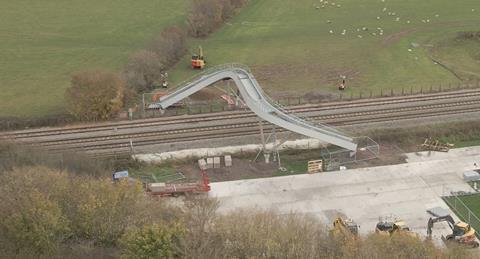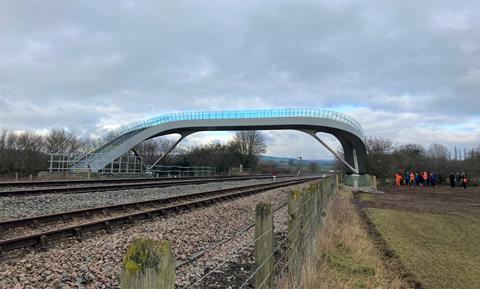
UK: A prototype Fibre-reinforced polymer, Lower cost, Optimised design, Working — or FLOW — footbridge developed to enable the affordable replacement of foot crossings has been opened in Shropshire.
The FLOW bridge was designed and funded by Network Rail’s Research & Development team in partnership with Foflo, Knight Architects, Jacobs, Sui Generis, KS Composites, JT Consulting, Q-Railing, Insenys and Balfour Beatty.
It is around 40% cheaper than traditional steel structures.

No concrete is used in the foundations, reducing its carbon footprint, and it is half the weight of a steel bridge, meaning lower transportation and installation costs. The majority of construction can be undertaken off site, meaning installation can take place without major disruption to rail services.
A real-time structural health monitoring system tracks usage and provides data to support maintenance and future improvements to the design.
‘This prototype has the potential to transform railway crossings, making them safer, more affordable and fit for the future’, said Owen Thomas, R&D project manager at Network Rail. ’Not only is FLOW durable and efficient but the design is also aesthetically pleasing.’
Plans are being developed for an accessible version with lifts and ramps for use in suitable locations.

The 21 m long prototype bridge has been installed at the site of a rural crossing near Craven Arms which was closed a number of years ago after being deemed unsafe because pedestrians had poor visibility of oncoming trains. The closure led to a significant detour for pedestrians to cross the line.
‘We want to close as many dangerous level crossings as possible, and this new footbridge shows it can be done while saving taxpayers money and without the need to disrupt passengers’ journeys during installation’, said Nick Millington, Interim Route Director at Network Rail Wales & Borders.


